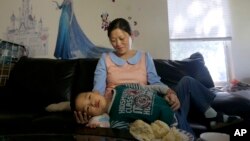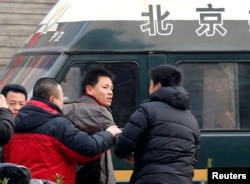Liu Xiaodong, 40, pregnant wife of prominent Chinese dissident Zhao Changqing, arrived in San Francisco Wednesday with their 4-year-old son to live as refugees.
Her husband, 47-year-old Zhao, has been a leading defender of human rights and democracy in China since the student-led 1989 Tiananmen Square protests. As a former student leader and prominent political “prisoner of conscience,” he has been imprisoned six times in the last 27 years.
After spending two months in Thailand, Liu acquired a U.S. visa with the aid of Initiatives by China/Citizen Power for China, a grassroots movement dedicated to a peaceful transition to democracy. The group's president, Yang Jianli, escorted Liu onto U.S. soil.
“When my identity was revealed in Thailand, I was concerned, because Thailand is not safe," Liu told VOA's Mandarin Service, explaining that her husband now lives in Beijing under heavy surveillance. "It is risky for those fleeing China.”
Liu is just one of many Chinese dissidents and activists who have fled to neighboring Thailand for asylum over the past several years, but the Southeast Asian country is no longer a safe haven. Many Chinese nationals have been forcibly returned to China in cross-border arrests, which are often described as kidnappings. Hong Kong publisher Gui Minhai, who disappeared from Thailand last year, later appeared on Chinese state TV to confess a wrongdoing.
“I hope Zhao [can] come to the United States," Liu added, describing him as kind, honest and "firmly committed to his belief." "Our kids are small. The older one is only 4; the other is not born yet. They need their father.”
Having spent a cumulative total of 11 years in prison, Zhao was released on bail July 7, Liu said, adding that she spoke to him while traveling. She said that although he is doing fine physically, he continues to have difficulty finding a permanent home. His intention is to stay in China and continue his work.
"He has already been summoned by police and was told he is not ‘welcome’ to live in Beijing, so he doesn’t know where he will live or find a job,” she said. "I respect him, but as his wife, I hope he won’t be imprisoned again. It would be a disaster for our family and our kids that we cannot face."
In 2005, Zhao refused to participate in a flag-raising ceremony or sing the national anthem. He was put into solitary confinement for more than a month. He was later returned to solitary confinement for refusing to take part in military drills and for receiving Falun Gong members, according to published reports.
Zhao was part of a loose network of grassroots activists known as the New Citizens Movement who, in 2013, were targeted by Chinese authorities as part of a broad crackdown on dissent. That year, members of the movement, including its founder Xu Zhiyong, were accused of orchestrating five rallies in Beijing. Dozens were taken into custody across the country and at least 10 were put on trial.
Chinese authorities found Zhao and three other activists guilty of “gathering a crowd to disturb order in public” for planning street protests and sentenced Zhao in April 2014 to two years and six months' imprisonment.
Yang said Liu will live with supporters in suburban Hayward, California, and take care of her children. Her baby is due Aug. 23.
Produced in collaboration with VOA's Mandarin Service. Portions of this report are from AP.






